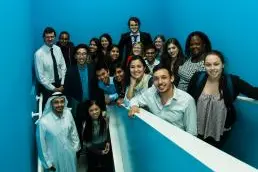PHOTO
Doha - Hamad bin Khalifa University (HBKU), a member of Qatar Foundation for Education, Science, and Community Development (QF),hosteda delegation of students from Rice University's James A. Baker III Institute for Public Policy (Baker Institute) from March 1st to March 5th as part of a program that works with students from both America and Qatar and seeks to promote cross-cultural understanding and dialogue on public policy and diplomacy issues. Key themes of the 2015 conference included education, energy, health, and gender and equality.
The Public Diplomacy and Global Policymaking (PDGP)exchange between Rice University and HBKU offers both American and Qatari students the opportunity to inform and engage each otherin facilitated discussions. The program lasts one week and encourages visiting students to experience Arab or American culture in an effort to learn how cultural identity, political context, and geography affect policy.
Though much of the learning takes place during organizedlectures and discussions, conversations often continue into meal times or breaks, solidifying connections between the cohorts and highlighting an interest in understanding each other's diverse viewpoints and backgrounds.
Hurst Williamson, a senior at Rice University, majoring in history and political science as well as being student director of the PDGP delegation, commented: "You can read as many books and articles as you like about the Gulf region, but the opportunity to interact with people in Qatar gives those of us visiting from the U.S. a depth of knowledge of the regional issues that's only possible if you engage with people here on a personal level.
"This is my second time coming to Doha as part of this exchange. Both visits have been remarkable and have given me a truly rewarding experiences."
Natalie Diong a senior majoring in culture and politics at Georgetown University in Qatar, added: "This is my first time taking part in this program and I've found it's given those of us who are based at an Education City campus a great opportunity to explore issues with students who are based outside Doha from a different institution to me. It's given us a great opportunity to collaborate together."
This year's program included talks by Dr. Louay Safi, Professor of Public Policy at HBKU's Qatar Faculty of Islamic Studies (QFIS) on developments in education, Noor Al Malki, Director of Doha International Family Institute on family, gender and identity in Qatar, and Dr. Faleh Ali of the Supreme Council of Health on Qatar's National Health Strategy. Students also toured Education City, the Museum of Islamic Art, and the Al Sulaitan Farm.
In line with HBKU's aim to drive collaboration with international partners, the exchange program is now in its fifth year and allows both new and old participants to engage with each other in greater depth. The initiative is committed to empowering students to think critically, focusing on leadership development and catering to students passionate about policy making. Alumni of the program have gone on to continue the dialogue started during one of the official weeklong sessions,thereby building longer-term bridges of trust and understanding with friends across the world.
-Ends-
About Hamad bin Khalifa University
Hamad bin Khalifa University (HBKU), a member of Qatar Foundation for Education, Science and Community Development, is an emerging research university building upon unique collaborations with local and international partners. Located in Education City, HBKU seeks to provide unparalleled opportunities for scholarship, teaching, discovery, and learning for all of its students through an array of interdisciplinary programs.
HBKU's partners are Virginia Commonwealth University in Qatar, Weill Cornell Medical College in Qatar, Texas A&M University at Qatar, Carnegie Mellon University in Qatar, Georgetown University School of Foreign Service in Qatar, Northwestern University in Qatar, HEC Paris in Qatar, and UCL Qatar.
© Press Release 2015




















